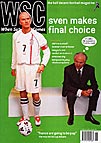 Ian Plenderleith burrows through the heaving mass of World Cup sites to discover the debut official song and the meaning of Korea's "intangible cultural assets"
Ian Plenderleith burrows through the heaving mass of World Cup sites to discover the debut official song and the meaning of Korea's "intangible cultural assets"
Predictably enough, there has been a huge amount of cyberspace set aside for online coverage of the coming World Cup. The following is an attempt to help you focus on the least drivel-ridden websites.
A good starting point are the two official World Cup sites of the Japanese and South Korean organising committees (JAWOC and KOWOC) featured here a couple of years back. As well as showing the now mostly completed stadiums in all their finery, they provide some cultural background on the regions and venues which, despite their tourist brochure tone, will provide a helpful antidote to the inevitable guff about sushi and the martial arts that will spring from the lips of commentators and the pens of headline writers through the month of June (“In the land of the rising sun, England’s World Cup hopes last night sank behind a mountain of despair…” is probably keyed in to a number of laptops already).
They will help fans appreciate important aspects of WC2002 such as the Korean city of Suwon’s “unique and clean bathrooms” and its “home stay programs for foreigners to experience the living culture and filial piety of Korean families” (that should be an eye-opener for any participating members of Sven’s Barmy Army). Meanwhile at Jeonju one can enjoy, incorporated into the stadium design, the “metaphorical Gaya 12-stringed instrument representing Jeonju’s intangible cultural asset”.
Anyone planning to use the World Cup to make religious converts should know from the official stadium rules that “proselytising” is banned inside grounds. The Korean website also provides a prescient analysis of forthcoming hooligan incidents: “In the stadium, violence may occur between rival supporters, and some fans might even invade the playing field. In most cases, such incidents stem from disturbance of order fanned by mob psychology.” Good to know that’s sorted out then.
For excellent background on the kind of alco-fuelled disputes that will arise over World Cups past, World Cup Archive is strong on both pictorial and statistical history, and helpfully lists the records of individual nations and their squads for each finals. There is even an encouraging table for Scotland fans showing that they are, at the time of writing, the 21st most successful side in the finals’ history. Easily navigable, it also features up-to-date news and features in anticipation of the coming fest.
Focusing more specifically on the World Cup’s debut, the gallery section of The 1930 World Cup Museum depicts some fascinating memorabilia to show that people who collect footballers’ pictures and small, metal commemorative pins are nothing new. Also featured is the official 1930 World Cup song, The Glorious Eleven by the Typical Orchestra, a tango released on gramophone record format only, and for which, sadly, there is no MP3 file. The site’s main joy lies in its postcards, tickets, programmes, and that still glorious official poster of the stretched-out goalkeeper.
One of the more original sites, surprisingly, is Umbro’s Bunk Off virtual sitting-room, where you can download an official DSS sick note for your doctor and read some lightly amusing ideas on how to recreate the World Cup atmosphere at home, such as dropping litter all over the garden, getting your dad to masquerade as a ticket tout and then chucking two grand out of an upstairs window – the amount you might be expected to lose (at least) if making the pilgrimage east.
The downside is represented by a range of profoundly unexciting columnists such as Kenny Sansom (“There’s a lot more to football than actually kicking a ball”), Alan Shearer (“England must finish in the top two to advance”) and “Our Man in Japan” Steve Perryman, who helpfully warns the England team that it’s going to be hot and humid, and that late on in the game they could get tired.
Such unedifying observers appear on sites of all shapes and sizes, including extensions of the magazines and newspapers we all know and appreciate to varying degrees. Of all the guides, it’s little surprise that The Guardian already boasts one of the best in terms of background and archived news and features, while the BBC site is reliable and surf-friendly, although you should avoid at all costs the painful “Motty’s Memories”.
My favourite moment, however, came from a site purporting to look at the World Cup from the Malaysian point of view: “The Malaysian football team started the year 2002 on a bitter note as they slipped a step down in the world rankings from 111th to 112th,” it notes in its headline article. I hope they get over their bitterness and sit back to enjoy being useless and at home rather than having to face Sweden, Argentina and Nigeria.
From WSC 184 June 2002. What was happening this month